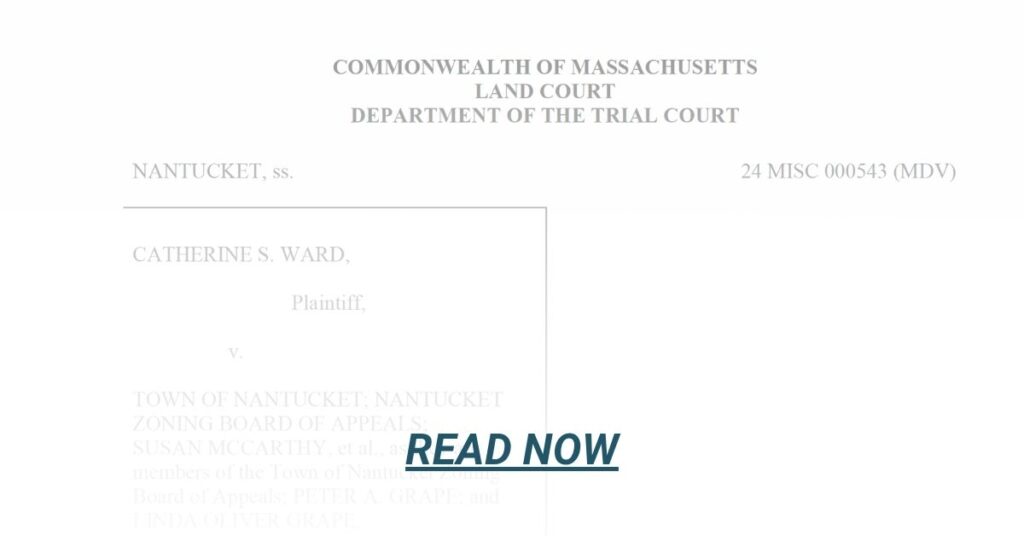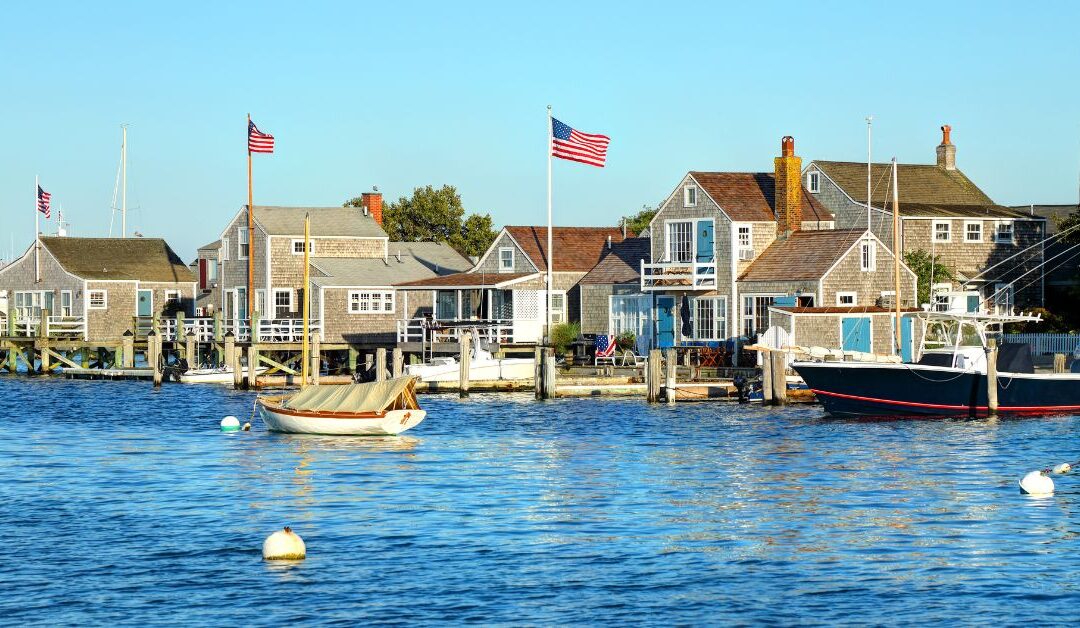Updated on June 12, 2025
The Town of Nantucket will appeal a Massachusetts Land Court ruling prohibiting most short-term rentals in the island’s Residential Old Historic zoning district, setting the stage for a high-stakes legal battle that could shape the future of vacation rentals across the island.
The decision on June 6, 2025, by Land Court Judge Michael Vhay sided with resident Catherine Ward in her lawsuit against her neighbors, Peter and Linda Grape, and the Nantucket Zoning Board of Appeals (ZBA). Catherine argued that the Grapes’ short-term rental violated local zoning laws. Judge Vhay agreed, ruling that “the current Nantucket Zoning Bylaw does not allow rentals shorter than 31 days of ‘primary dwellings’ in the Nantucket Residential Old Historic district, except for ‘the rental of rooms within an owner-occupied dwelling unit.’”

The court overturned a 2024 decision by the ZBA that had previously deemed the Grapes’ short-term rental operation permissible. The ruling applies only to the Residential Old Historic zoning district, but some fear it could set a precedent affecting other residential areas on Nantucket.
Town officials moved quickly to respond. After a closed-door executive session with the ZBA on June 10, 2025, the Select Board announced that it would pursue an appeal.
“The Boards met jointly in executive session on June 10, 2025, and voted unanimously to seek appellate review of the Decision,” the town stated in its announcement. “The Select Board will issue further updates on significant developments as they occur.”
Planning Board Chair David Iverson said town counsel had advised that an appeal could help limit disruption to summer rental agreements already in place. He acknowledged the ruling exposed long-standing ambiguities in the zoning code.
“I also don’t think he’s wrong in saying that unless it’s expressly allowed in the zoning code, it’s not allowed,” David told the Nantucket Current. “That’s our problem. They’re not legal.”
Nantucket draws hundreds of thousands visitors annually, many of whom come to enjoy the island’s beaches, historic charm, and natural beauty. Known in the 18th century as the whaling capital of the world, today the island is celebrated for its cobblestone streets, public beaches, fresh seafood – including traditional clambakes – and quaint harbor town atmosphere. The Residential Old Historic district, where the ruling applies, is one of the most charming parts of the island, with its preserved architecture, tree-lined lanes, and proximity to shops, restaurants, and waterfront vistas.
The lawsuit is the latest chapter in a years-long debate over whether short-term rentals, an established practice on Nantucket for generations, are legal under local zoning rules. Because the bylaw does not explicitly list short-term rentals as permitted, operators have relied on their classification as accessory uses, a claim that Judge Vhay rejected.
Catherine Ward’s lawsuit was funded by ACK Now, a political group founded by summer resident Peter McCausland that has led the charge to restrict short-term rentals. Peter called the decision a win for the group’s interpretation of the bylaw.
“The judge held that short-term rentals are not permitted in the residential district,” Peter told the Current. “If it’s true, and I haven’t read it yet, it seems to me the judge probably made a correct decision.”
The ruling has raised broader concerns among real estate professionals and residents about potential ripple effects. Penny Dey, a local broker and former president of the Nantucket Association of Real Estate Brokers, questioned whether the decision could threaten all types of rentals not explicitly named in the zoning bylaw.
“Does this mean that rentals of longer than 31 days—monthly rentals, seasonal rentals, winter or even year-round rentals—could also be legally challenged and found to be in violation?” Penny asked in an interview with the Current. “What will the town be doing to enforce zoning going forward?”
Nantucket officials have repeatedly tried to clarify the legality of short-term rentals through bylaw amendments at Town Meetings. However, efforts to codify the practice have failed six times. The most recent attempt on May 5, 2025, won a majority but fell short of the two-thirds vote needed to pass.
Before that vote, Town Counsel John Giorgio warned residents about the legal risks of inaction.
“If you don’t [approve this], as I’ve said before, you’re leaving it in the hands of a judge in Boston to make this decision for you,” John said. “That comes with a substantial amount of risk to the town, to homeowners, both seasonal and year-round residents.”
Those risks are now being realized, and with the appeal process underway, Nantucket’s short-term rental operators remain in legal limbo.
Judge Vhay remanded the case to the ZBA for further proceedings within 45 days of his ruling, though those steps could be paused as the appeal moves forward.
For now, rentals under 31 days in the Residential Old Historic district are banned unless the owner occupies the home and rents rooms within it. Other neighborhoods could see similar rulings unless town regulations are updated or challenged case by case.
The outcome of the appeal could have major implications not only for the Grapes and their neighbors but also for hundreds of homeowners and businesses in Nantucket that depend on short-term rental income, and for vacationers who rely on them each summer.
…


